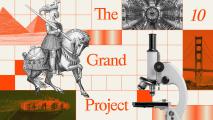Damage to the heart after a heart attack is usually permanent. But scientists have created a new technique for repairing cardiac muscle post-heart attack by delivering gene silencers straight to the heart muscle. These gene silencers “turn down” genes that inhibit healing.
In a new study in pigs, a close model for human hearts, the therapy led to new cell growth and enhanced cardiac function after a heart attack.
Why this matters: The heart can build new muscle and possibly mend itself, but the pace is so sluggish that it usually cannot repair the extensive damage produced by a heart attack. That’s why, in the aftermath of a heart attack, scar tissue often forms instead of functional muscle tissue.
“This is a potentially transformational strategy to treat human heart failure.”
James Martin
A damaged heart is a scary thing, and for good reason. Within five years of their first heart attack, almost 20% of people aged 45 and older will have another. Finding therapeutic ways to better those odds is critical.
What is the Hippo signaling pathway? In animals and people, the Hippo signaling pathway regulates cell growth and death, therefore controlling organ size. When patients have heart failure, the Hippo signaling pathway becomes more active, inhibiting heart healing. Temporarily turning off the Hippo signaling system in mice whose hearts mimicked human heart failure allowed them to recover, and their hearts pumped again.
“Patients suffering from heart failure have very limited treatment options, and up to this point, it had essentially been impossible to bring heart muscle back in humans following an injury regardless of available technology and knowledge,” James Martin, lead researcher on the team, said.
A pig’s heart: Pig hearts are, perhaps surprisingly, a good model for studying the human heart.
In a study in Science Translational Medicine, the team from Baylor College of Medicine and the Texas Heart Institute measured heart function in two groups of pigs that had heart attacks. The team gave the first group a gene therapy to turn off the Hippo signaling pathway, while the other group’s remained active.
They found that the pigs that received the treatment recovered more heart functionality than those that did not.The pigs that received the treatment had a 14.3% improvement in circulation of the left ventricle, and there was evidence of growth in the heart muscle. The treated pigs also had less scarring compared to the untreated pigs.
Next step, human trials: “We were excited by the results,” said Shijie Liu, lead author of the study. “Three months after we treated the pigs, those that received the gene therapy had improved their heart function, showed signs that their cardiomyocytes were regenerating, had less fibrosis or scarring and had evidence that new blood vessels had formed. The procedure was shown to be safe since the pigs tolerated the therapy very well.”
The study brings the team one step closer to testing this gene therapy in human trials.
“This is a potentially transformational strategy to treat human heart failure,” co-author James Martin said. “It taps into the healing capacity of the heart, promoting heart muscle self-repair and improved function, which can make a substantial difference in the lives of those who suffer a heart attack.”
We’d love to hear from you! If you have a comment about this article or if you have a tip for a future Freethink story, please email us at [email protected].






